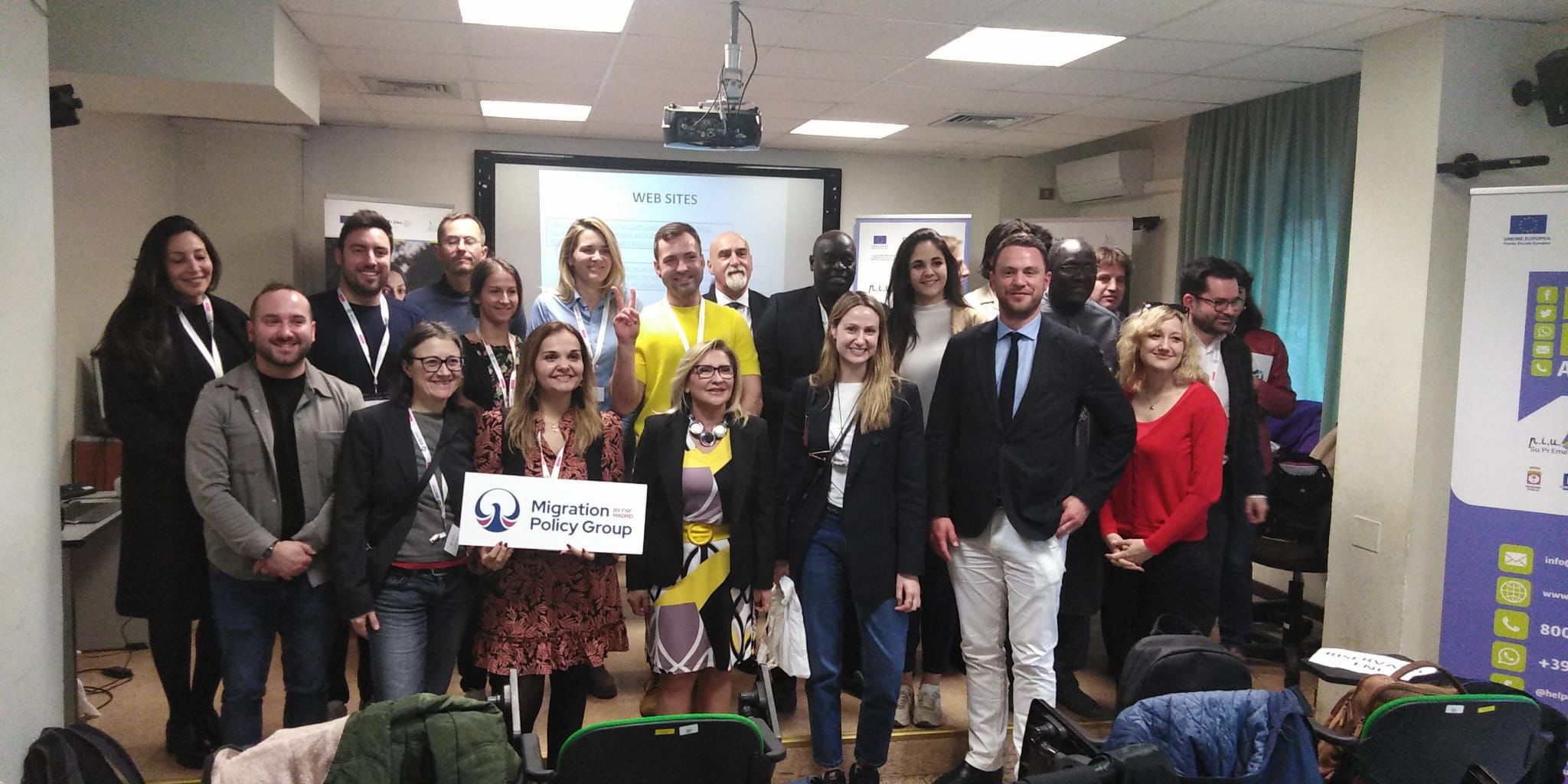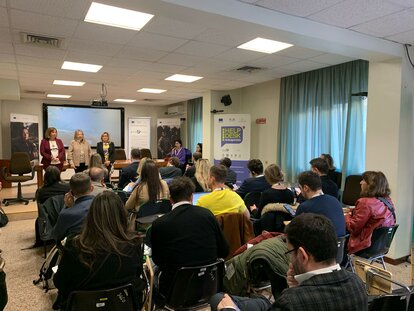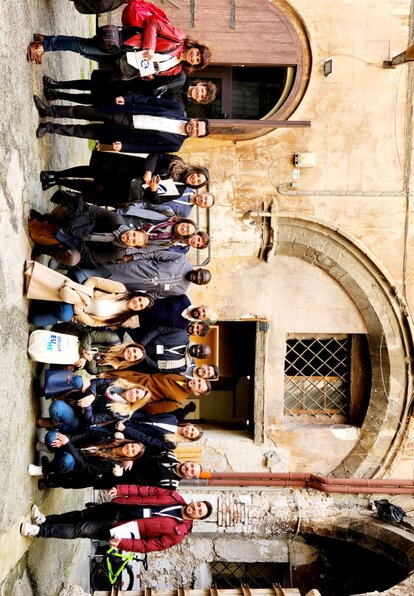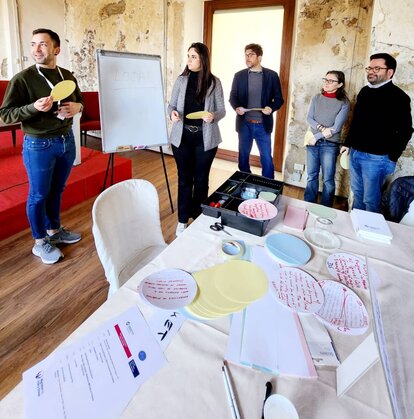Migration
Sicily: A Key Transit and Arrival Port on the Migration Map

Members of the Migration Policy Group during the Migration working program in Sicily
Sicily, a transit and destination spot
The island of Lampedusa, Italy's southernmost island, it is at the epicenter of the debate when it comes to migration debate in the European Union. The island, which is part of the Sicilia region, is located just 12 kilometers off the coast of the Tunisian city of Sfax, making it a first port of call for many crossing from North Africa. In fact, the worsening economic and social situation in Tunisia has contributed to the surge in migrant arrivals, which led Italy's right-wing government to declare a six-month state of emergency in April 2023 (Reuters, 2023a).
Amid the migrant influx and as a response to an invitation from Meloni calling for help, the European Commission President Ursula von der Leyen visited Lampedusa in September 2023, where, together with the Italian PM, presented a 10-point European response plan to the migration crisis in Italy, underlining that illegal migration is a European challenge that requires a European response (Pereda, 2023).
In 2023, the number of migrants arriving on Italian shores increased by 50% compared to the previous year. While in 2022 103,846 migrants arrived in Italy, in 2023, there was an increase with the arrival of 155,754 migrants. Other 17,000 are unaccompanied minors, a group that concerns the Italian government. Moreover, arrivals in 2023 were near the peak recorded in 2016, when about 181,500 migrants arrived by sea to Italy. The peak of arrivals in 2023 took place in August, when 25,673 migrants arrived (De Leo, 2023).
The FNF Madrid Migration Policy Group had the opportunity to hear about the challenges and to learn from the experiences of a wide array of stakeholders and actors in the migration field. Representatives from reception centers, local authorities and migrant entrepreneurship ecosystems, such as Centro Astalli Palermo and the Special Immigration Office of the Sicilian Region, shed light on how migration processes shape opportunities and economic challenges in Sicily, as both a transit and destination spot.
Furthermore, the agenda included an internal workshop aimed at defining partner products and projects for 2024, as well as defining marketing strategies for promoting the Migration Policy Group products.
Members of the Migration Policy Group during the Migration working program in Sicily

Members of the Migration Policy Group during the Migration working program in Sicily
Centro Astalli, much more than a reception center
The Centro Astalli stands as a pivotal institution offering first reception services to migrants newly arrived in Italy, alongside training programs designed to foster the inclusion and socio-occupational autonomy of refugees. Nestled in the heart of Palermo's city center, this multifaceted reception and training center provides a beacon of hope and opportunity for those navigating the complexities of displacement and resettlement.
At the Centro Astalli, the Migration Policy delegation had the opportunity to know the work carried out by the center, which was presented by his Director, Emanuelle Cardella.
During the visit, there were opportunity to gain insight into the center's operations, witnessing firsthand the transformative impact it has on the lives of migrants and refugees. Through a series of testimonials, the Migration policy Group delegation heard stories of resilience and determination, exemplifying the power of education and skill building in forging brighter futures.
Among those, sharing their journeys was Ameth Kah, originally from Gambia, whose narrative underscored the profound significance of the training programs offered at Centro Astalli. Kah recounted his trajectory, emphasizing how the culinary training he received enabled him, alongside seven fellow migrants, to establish Kirmal, a catering company. Kah's story serves as a testament to the center's unwavering commitment to empowering individuals to not only rebuild their lives but also to contribute meaningfully to their communities.
Is Training in Origin Countries the Key to Effective Migration Management?
At the Special Immigration Office of the Sicilian Region, Director Michela Bongiorno, alongside representatives from the migration unit, provided insights into the measures undertaken by public entities in Sicily.
During the session with representatives from Regione di Sicilia, the Migration Policy Group delegation had the opportunity to hear about the achievements of a pilot project conducted with Tunisia. Initially targeting the training of 400 individuals before their migration to Italy, the project significantly exceeded expectations, benefitting 700 participants in total. Notably, a substantial majority of these individuals successfully secured employment contracts, highlighting the tangible efficacy and profound impact of the initiative. Director Bongiorno emphasized that such proactive approaches are essential for effective migration management moving forward.
Given the unique dynamics of the migration landscape in Sicily, Director Bongiorno elaborated on the region's distinctive regional law for reception and inclusion, approved for the period of 2021-2027. This legislation empowers the Immigration Office to conceptualize and execute projects across the five southern regions, thus ensuring tailored responses to the evolving needs of migrants and fostering inclusive communities.
The last day of the visiting program took place in the village of Piazza Armerina, where the delegation of the Migration Policy Group came together to share experiences and best practices. The agenda included collaborative sessions aimed at proposing activities and products, all with the overarching goal of developing a cohesive joint action plan.

About the Migration Policy Group
Being aware of the multiple challenges posed by migration management in the Mediterranean region, the Mediterranean Dialogue project of the FNF project office in Madrid launched the Migration Policy Group in 2020. This initiative aims to bring together liberal policymakers and experts in order to harmonize proposals and political action addressing migration issues.
The Migration Policy Group coordinates the work of policy makers - including Members of the European Parliament, members of national parliaments, regional and local elected officials - and experts to harmonize proposals and political action addressing migration issues. The unique nature of the group resides in its geographical diversity. The Policy Group’s members come from both Southern and Eastern Europe; West Africa and the Middle East. Because of the composition, the Policy Group serves as a much-needed platform of cooperation between different regions allowing reciprocal learning and sensitizing according to the rules of mutually beneficial partnerships. What is worth noting, these processes within the group occur not only on the ‘Southern Europe – Eastern Europe’ line, but also between Europe and Africa, which confirms the originality of the project.
The FNF Madrid Migration Policy Group is also characterized by its wide and exhaustive scope of interest. It covers three fundamental axes of the political analysis of the migration phenomenon: the countries of destination, transit and origin.

